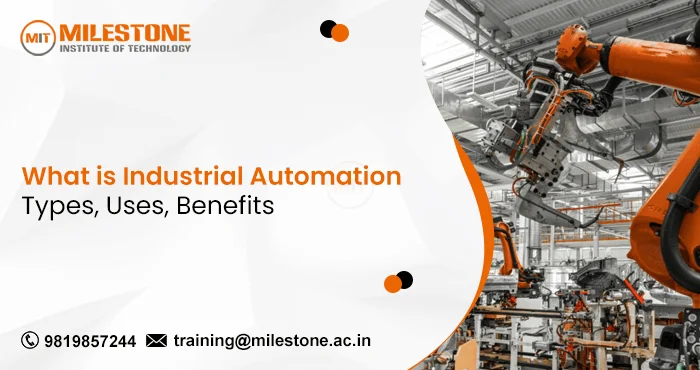In this modern world which is evolving daily, the term ‘automation’ has become more popular which focuses on efficiency, precision, and innovation. In particular, industrial automation marks a fundamental change in the way manufacturing and production operations are organized and carried out. Automation in the industrial sector refers to a wide range of technologies and processes that are used to optimize productivity and streamline processes, from robotics to assembly lines. In this complete guide, we will understand “
what is industrial automation”, its types, uses, benefits, applications, where to learn and many more.
Types of Industrial Automation
Industrial automation can be categorized into several types based on the level of
automation and the technology employed:
1. Fixed Automation:
Fixed automation involves the use of specialized equipment to carry out a specific task or set of tasks repeatedly. Examples include dedicated machinery for assembly, welding, and packaging. While highly efficient for mass production, fixed automation lacks flexibility and adaptability.
2. Programmable Automation:
Programmable automation utilizes computer-controlled systems to automate processes that require flexibility and customization. This type of automation is prevalent in industries where products have varying specifications or configurations.
Programmable logic controllers (PLCs) and numerical control (NC) machines are common components of programmable automation systems.
3. Flexible Automation:
Flexible automation combines the efficiency of fixed automation with the versatility of programmable automation. It employs advanced robotics, sensors, and control systems to adapt to changing production requirements quickly. Flexible automation is ideal for industries that demand high levels of customization and rapid production cycles.
Uses of Industrial Automation
The applications of industrial automation span across numerous industries and sectors, including manufacturing, automotive, aerospace, healthcare, and logistics. Some common uses include:
- Manufacturing: Automation streamlines production processes such as assembly, machining, and quality control, leading to increased productivity and reduced labor costs.
- Robotics: Industrial robots perform tasks such as welding, painting, material handling, and inspection with precision and efficiency.
- Process Control: Automation systems monitor and control industrial processes such as chemical production, power generation, and wastewater treatment to ensure safety, efficiency, and regulatory compliance.
- Supply Chain Management: Automation technologies such as warehouse automation, conveyor systems, and autonomous vehicles optimize logistics operations, from inventory management to order fulfillment.
- Healthcare: Automation enhances patient care through medical imaging, robotic surgery, automated dispensing systems, and telemedicine solutions.
- Smart Buildings: Building automation systems regulate heating, ventilation, lighting, and security to improve energy efficiency, occupant comfort, and operational efficiency.
Benefits of Industrial Automation
The adoption of industrial automation offers a multitude of benefits for businesses and society as a whole:
- Increased Productivity: Automation accelerates production processes, reduces cycle times, and minimizes downtime, resulting in higher output and faster time-to-market.
- Improved Quality: Automation systems ensure consistency, accuracy, and precision in manufacturing, leading to higher product quality and fewer defects.
- Cost Reduction: By automating repetitive tasks and optimizing resource utilization, businesses can lower labor costs, minimize waste, and enhance operational efficiency.
- Enhanced Safety: Automation eliminates or reduces human involvement in hazardous or repetitive tasks, thereby mitigating the risk of workplace accidents and injuries.
- Resource Conservation: Automation technologies promote sustainable practices by optimizing energy usage, reducing material waste, and minimizing environmental impact.
- Innovation Catalyst: Automation fosters innovation by enabling rapid prototyping, iterative design, and the integration of advanced technologies such as artificial intelligence and internet of things (IoT).
Applications of Industrial Automation
Industrial automation finds application in a wide range of industries and processes:
- Automotive Manufacturing: Automation is integral to automotive assembly lines, where robots perform tasks such as welding, painting, and assembly with precision and efficiency.
- Food and Beverage Processing: Automation streamlines food processing and packaging operations, ensuring compliance with quality standards and hygiene regulations.
- Pharmaceutical Production: Automation systems facilitate the manufacturing and packaging of pharmaceutical products, maintaining sterility and traceability throughout the process.
- Oil and Gas Exploration: Automation technology controls drilling rigs, monitors pipelines, and optimizes extraction processes in the oil and gas industry, enhancing operational efficiency and safety.
- Electronics Assembly: Automation plays a crucial role in electronics manufacturing, where precise assembly and testing are essential for product quality and reliability.
- E-commerce Fulfillment Centers: Automation enables fast and accurate order processing, inventory management, and shipping in e-commerce fulfillment centers, meeting the demands of online retail customers.
Which is the Best Institute to Learn Industrial Automation
When it comes to acquiring the knowledge and skills required for a career in industrial automation, choosing the right institute is crucial. One notable institution renowned for its comprehensive
industrial automation training programs is the Milestone Institute of Technology. With state-of-the-art facilities, experienced faculty, and industry-aligned curriculum, Milestone Institute of Technology offers hands-on training in PLC programming, robotics, SCADA systems, and industrial networking. Graduates of Milestone Institute of Technology are equipped with the expertise and certifications necessary to excel in this field.
Frequently Asked Questions
What are the key components of an industrial automation system?
Key components include sensors, actuators, controllers (such as PLCs and SCADA systems),
human-machine interfaces (HMIs), and networking infrastructure.
How does industrial automation impact employment?
While automation may lead to job displacement in some sectors, it also creates new opportunities for skilled workers in areas such as system design, programming, maintenance, and system integration.
How can I get started with learning industrial automation?
Enroll in a reputable training program or institution such as the Milestone Institute of Technology, where you can gain hands-on experience and industry-recognized certifications in industrial automation.




